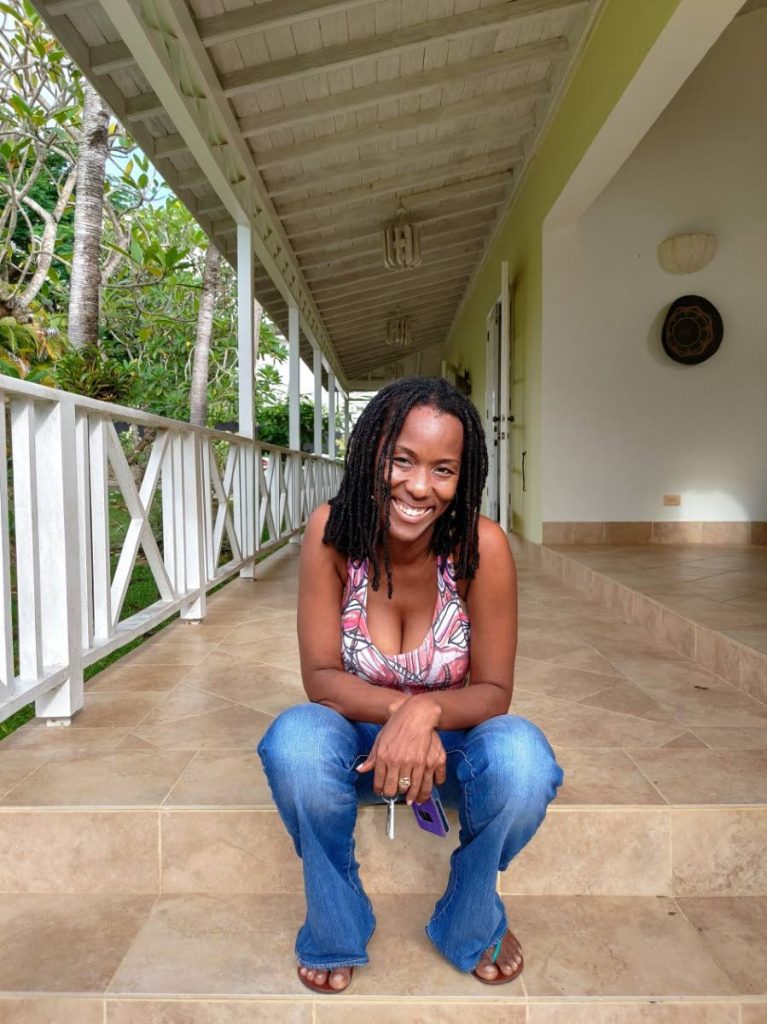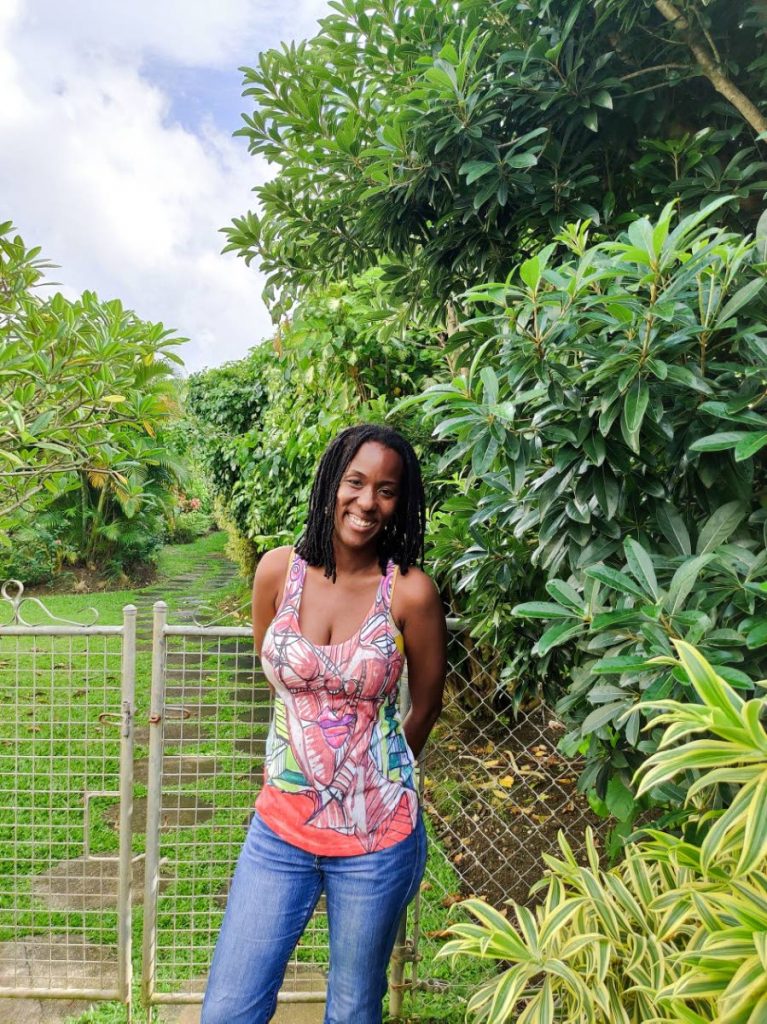Nothing fancy

AS TOLD TO BC PIRES
My name is Tonni Brodber and I really feel I know nothing about anything.
Brodber is a Jamaican-Welsh name. The spelling was Bro-a-dber first.
A man in Wales got in some fight over something and got banished to Jamaica. And married black. And here we are!
I’ve been married for four years to Kashka Hemans, a Jamaican who adopted Trinidad. We have two boys, Eli and Noel. Eli is Bajan (in personality) and Noel, clearly, Trini. He wakes up smiling and dancing.
Kashka was training Eli to be Jamaican, singing Rastaman Live Up and all. Eli loved Chronixx (until) I played Kes’ Savannah Grass for him once. It’s been on repeat since. Kashka wasn’t happy.
We dated for two years at Mona and broke up when he went to live in Trinidad and I moved to China.
I got a job offer in Barbados and I knew that, if I took it, I wasn’t finding no man, because every couple in Barbados been dating since they were 12.
Kashka and I were always in touch, writing and calling. We had a strong friendship. And then he said, “So… we doing this? We going to get married?”
My father Evon Brodber’s Jamaicanness could never merge with the Trini-ness. So he went back to Jamaica.
My mother, Rosina, and I stayed in Trinidad. Eventually, they divorced and my mother met my stepfather. And we went to Canada.
My mother is Trinidadian, but her parents were Bajan.
My stepfather, Jan Loubser, an Afrikaans man, got kicked out of (apartheid) South Africa after suggesting in a speech at Stellenbosch University that maybe these blacks are equal.
He’s just turned 88.
I’m really grateful to have two such magnificent men in my life, as well as my uncles.
I don’t know if I’m a believer. Joseph Campbell’s The Hero Has Many Faces made a very good point. But I had to push the book away with my foot. I was just uncomfortable with the notion that there is nothing out there that cares about me!

You go from Trinidad to a suburb of Ottawa, where you and your mother are the only black people in the whole town.
The level of self-despair over not fitting in…
I was very lonely, I missed my brothers and my cousins, who were like my sisters, desperately.
I looked in the mirror and was just, like, “I wish I were white!” I was eight years old.
In Trinidad, I was aware I was black, my hair was tight curls, but I still felt like I was “Tonni,”
In Canada, it felt like I was black-black-black-black-black-black-black-black-black-black – and all of that “black” (and only that “black”) defined “Tonni.”
I was probably the first black person people in my primary school ever saw.
I had seen more of the world and that gave me some stature. Most people in that town didn’t even have passports.
But I was still black.
Lack of diversity affects not only the first movers, the people who bring the diversity, but the people there first. Their scope for imagination is so narrow.
When our teacher told us he had gone sailing in the Caribbean, one boy in my class (rolled his eyes). “Oh, please! Like someone from here could go sailing!”
One boy in my class got vexed with me told me I was the colour of s--t. The teacher was, like, “Oh, I’m sure he didn’t mean anything by it.”
Children pick up early who are their allies. I knew this man was not in my corner.
When I was 13, I made a presentation to my mother and Jan that it was better for my mental and emotional well-being for me to (spend my teenage years) in Trinidad. I LOVED Canada but the intolerance and the racism was just too much! So my mother sent me to live with my aunt.
I am not a fan of “the prestige school” thing and the way the entrance exam ruins lives at ages ten or 11 – but I still love Bishop Anstey High School.
I am convinced I can change the world because I went to a school that made me think we (Bishops girls) could do what-ev-er!
Bishops girls were the bats. Convent girls were the “good-looking” ones.
Bajans, Grenadians, Vincentians, everybody else (West Indian) who got to Trinidad reinvented themselves.
Sparrow was Grenadian? What about the rest of his coming to know himself?
Trini-ness is the result of new migrants, the excitement of people who just reach and, look, there’s oil, there’s this, there’s that, and let we leggo!
Growing up in Trinidad, I saw colour. I remember, for real, “If you ain’t red, you dead!”
I was clear I wasn’t going to be the prettiest girl in the room, because I was dark.
But I was always going to be the smartest or the most interesting.
In Barbados, Crop Over, a girlfriend said, “Somebody just called us “darkies”! That’s offensive!”
I said, “But we’re dark-skinned!”
Barbados doesn’t talk about (race and racial descriptors) as much. I’ve met a lot of lovely white Bajans – but I can only have the Black Lives Matter conversation with white Trinis.
In your 20s and early 30s, you’re convinced you’ve got this world figured out. You know who you are. You feel you understand human nature and people… and then you have this Trump thing.
And you realise, no matter how much you’ve travelled, no matter how empathetic you think you are, you still do not truly understand someone else’s experience.
Most of what is Trini-ness – pan, calypso, doubles, soca – doesn’t come from any high class-ness. All of these people who we don’t highlight enough, that is the source of the creation, of the culture.
We like to borrow the culture and dash the people away, whether through SEA or whatever.
We really have to stop, because that is where the additional potential of our space lies.
Colleagues keep telling me, “You so hyper! You always excited!”
There is a side to that (which) can be destructive, to individuals and societies.
But when we (are able to) find the creation that comes out of that chaos consistently, and with the appreciation for all of the different contributors (to it), then we understand Trinidad and Tobago.
There are many things about me that are Trini.
The Bajan connection is a very Trini thing. The Jamaican connection, too.
So my Trini-ness is Caribbean-ness.
A Trini is a human being who will not accept any restrictions outside of those they place on themselves.
It’s going to sound like the opposite, but Trinidad and Tobago, to me, really does mean “peace of mind.” When I fly in over the mountains and see the green, I am put at peace. When I land, I feel grounded. In the cacophony, noise and chaos, I’m at peace in the excitement.
Read the full version of this feature on Saturday at www.BCPires.com


Comments
"Nothing fancy"